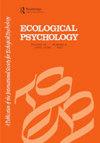What’s Inside Your Head Once You’ve Figured Out What Your Head’s Inside Of
IF 1.7
3区 心理学
Q3 PSYCHOLOGY, EXPERIMENTAL
引用次数: 28
Abstract
Abstract In this article, we investigate the foundations for a Gibsonian neuroscience. There is an increasingly influential current in neuroscience based on pragmatic and selectionist principles, which we think can contribute to ecological psychology. Starting from ecological psychology, we identify three basic constraints any Gibsonian neuroscience needs to adhere to: nonreconstructive perception, vicarious functioning, and selectionist self-organization. We discuss two previous attempts to integrate affordances with neuroscience: Reed’s ecological rendering of Edelman’s selectionism as well as Dreyfus’ phenomenological interpretation of Freeman’s neurodynamics. Reed and Dreyfus face the problem of how to account for “value.” We then show how the free-energy principle, an increasingly dominant framework in theoretical neuroscience, is rooted in both Freeman’s neurodynamics and Edelman’s selectionism. The free-energy principle accounts for value in terms of selective anticipation. The selection pressures at work on the agent shape its selective sensitivity to the relevant affordances in the environment. By being responsive to the relevant affordances in the environment, an agent comes to have grip on its interactions with the environment and can thrive in its ecological niche.一旦你弄清楚你的脑袋里在想什么
在这篇文章中,我们探讨了一个吉布森神经科学的基础。在基于实用主义和选择主义原则的神经科学中,有一种越来越有影响力的潮流,我们认为这可以为生态心理学做出贡献。从生态心理学出发,我们确定了任何gibson神经科学都需要遵守的三个基本约束:非重构感知、替代功能和选择性自组织。我们讨论了之前将能得性与神经科学相结合的两次尝试:里德对埃德尔曼选择主义的生态诠释,以及德雷福斯对弗里曼神经动力学的现象学解释。里德和德雷福斯面临着如何解释“价值”的问题。然后,我们展示了自由能原理,一个在理论神经科学中日益占主导地位的框架,是如何植根于弗里曼的神经动力学和埃德尔曼的选择主义的。自由能原理从选择性预期的角度来解释价值。作用于主体的选择压力塑造了其对环境中相关启示的选择敏感性。通过对环境中的相关启示做出响应,智能体开始掌握与环境的相互作用,并能在其生态位中茁壮成长。
本文章由计算机程序翻译,如有差异,请以英文原文为准。
求助全文
约1分钟内获得全文
求助全文
来源期刊

Ecological Psychology
PSYCHOLOGY, EXPERIMENTAL-
CiteScore
3.30
自引率
10.50%
发文量
8
期刊介绍:
This unique journal publishes original articles that contribute to the understanding of psychological and behavioral processes as they occur within the ecological constraints of animal-environment systems. It focuses on problems of perception, action, cognition, communication, learning, development, and evolution in all species, to the extent that those problems derive from a consideration of whole animal-environment systems, rather than animals or their environments in isolation from each other. Significant contributions may come from such diverse fields as human experimental psychology, developmental/social psychology, animal behavior, human factors, fine arts, communication, computer science, philosophy, physical education and therapy, speech and hearing, and vision research.
 求助内容:
求助内容: 应助结果提醒方式:
应助结果提醒方式:


